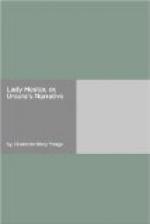That staggered her a little, but she said, “I do not wish to do him any harm, but I have my child’s interests to think of. How do I know what advantage may be taken against him?”
Torwood saw my father lying back in the chair, trembling, and he dreaded a fit every moment.
“I give you my word,” he said, “that no injustice shall be done you;” and as she looked keenly at him, as if she distrusted him, he said, “Yes, you may trust me. I was bred an English gentleman, whatever I was born, and I promise you never to come between you and your rights, when your identity as Lord Trevorsham’s daughter is fully established. Meantime, do you not see that your presence is killing him? Tell me where you may be heard of?”
“I shall stay at the Shinglebay Hotel till I am secure of the justice I claim,” she said. “Come, my boy, since your own grandfather will not so much as look at you.”
Torwood walked her across the hall. He was a little touched by those last words, and felt that she might have looked for a daughter’s reception, so he said in the hall—
“You must remember this is a very sudden shock to us all. When my father has grown accustomed to the idea, no doubt he will wish to see you again; but in his present state of health, he must be our first consideration. And unprepared as my sisters are, it would be impossible to ask you to stay in the house.”
She was always a little subdued by my brother’s manner; I think its courtesy and polish almost frightened her, high-spirited, resolute woman as she was.
“I understand,” she said, with a stiff, cold tone. Jaquetta heard the echo of it, and wondered.
“But,” he added, “when they understand all, and when my father is equal to it, you shall be sent for.”
When he went back to the library he found my poor father unconscious. It was really only fainting then, and he came round without anyone being called, and he shrank from seeing anyone but Torwood, explaining to him most earnestly how, though he was too ill himself to go to the place, his brother-officer, General Poyntz, had done so for him, and had been persuaded that the whole settlement and all the inhabitants had been swept off. It was such a shock to him that it nearly killed him. Poor father! it was grievous to hear him wish it had quite done so!
We only knew that the woman had upset my father very much, and that Torwood could not leave him. Word was sent us to sit down to dinner without them, and Torwood sent for some gravy soup and some wine for him. He went on talking—sometimes about us, but more often about poor Faith, who seemed to have come back on him in all the beauty and charm of his first love. He seemed to be talking himself feverish, and after a time Torwood thought that silence would be better for him; so he got him to go to bed, and sent good old Blake, the butler, who had been his servant in the army, to sit in the dressing-room. Blake, it turned out, had known all about the old story, so he was a safe person. Not that safety mattered much. “Lady Hester Lea”—she called herself so now, as, indeed, she had every right—was making it known at Shinglebay.




